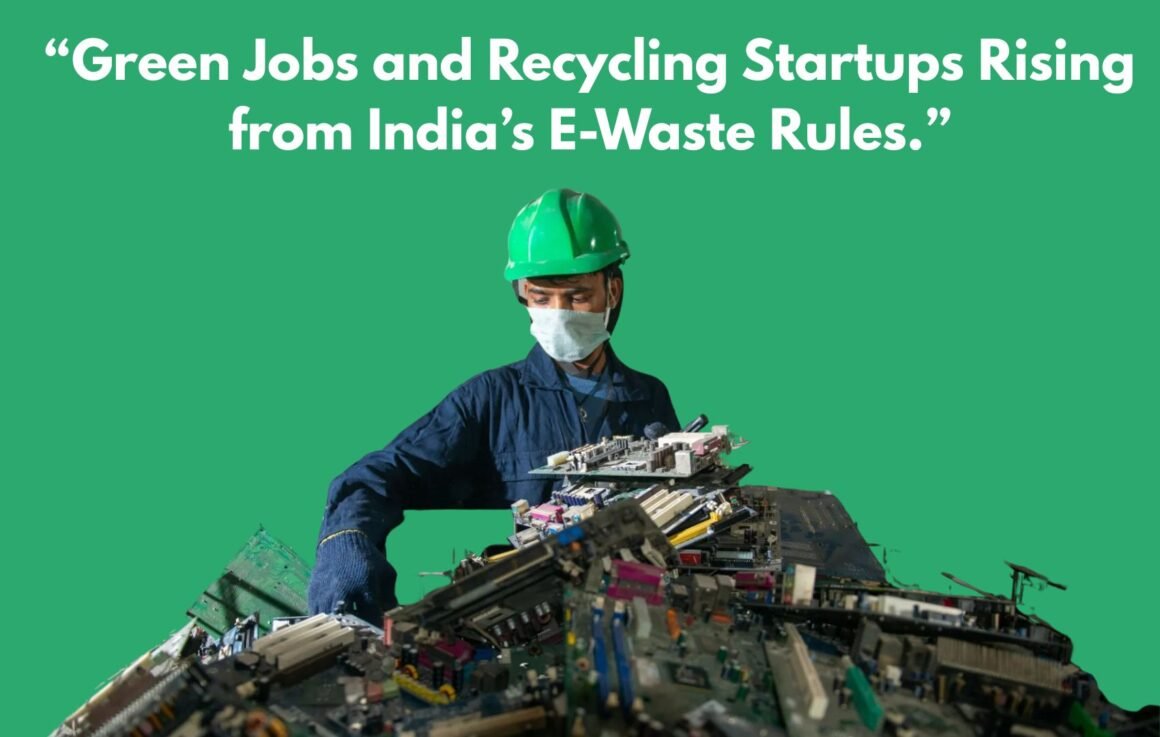How E-Waste Rules Promote Green Jobs & Recycling Startups
The exponential growth in electronics usage has made e-waste one of the most pressing environmental challenges of the 21st century. India, the world’s third-largest producer of e-waste, generates more than 1.6 million tonnes annually, and this number is growing by 30% each year.

The E-Waste (Management) Rules, 2022, implemented by the Ministry of Environment, Forest and Climate Change (MoEFCC), are a transformative step towards addressing this issue while unlocking opportunities in green employment, circular economy, and sustainable entrepreneurship.
Extended Producer Responsibility (EPR): Driving Systemic Change
The foundation of the E-Waste Rules lies in the Extended Producer Responsibility (EPR) principle. It mandates that producers, importers, and brand owners take accountability for the collection, recycling, and safe disposal of their electronic products. By introducing mandatory collection targets (starting from 60% and gradually rising to 80%), EPR encourages producers to collaborate with certified recyclers and logistics operators.
This regulatory push has led to a surge in startups offering EPR compliance platforms, take-back services, reverse logistics solutions, and recycling technologies.
One such example is Recykal, a Hyderabad-based digital waste management startup that connects consumers, recyclers, and brands via a tech-enabled marketplace. Other innovators like Attero Recycling and Hulladek are setting up large-scale recycling plants and expanding operations across multiple states.
Formalization and Job Creation: From Informal to Organized Growth
Before the 2022 Rules, over 95% of India’s e-waste was managed by the informal sector—local kabadiwalas and dismantlers using unsafe methods such as open burning and acid leaching. The new regulations have formalized recycling through authorization, traceability, and registration systems, moving the sector toward transparency and compliance.
This shift is generating significant employment across the value chain. From collectors and transporters to recyclers, quality controllers, and compliance specialists, the e-waste ecosystem is creating new green-collar jobs. According to the International Labour Organization (ILO), e-waste recycling can generate up to 1 million direct and indirect jobs in India by 2025 if formalized efficiently.
E-Waste Rules Promote Green Jobs & Recycling Startups: Turning Trash into Opportunity
E-Waste Rules Promote Green Jobs & Recycling Startups have given rise to a wave of innovation in recycling technologies and sustainability-driven entrepreneurship. Startups are focusing on:
- AI and robotics for automated waste sorting and dismantling.
- Urban mining techniques for extracting precious metals like gold, copper, and lithium.
- Digital platforms for waste traceability and compliance monitoring.
- Eco-design consulting to help electronics brands make recyclable products.
For instance, Cerebra Green operates one of India’s largest integrated e-waste recycling facilities, while Karo Sambhav collaborates with schools, companies, and local communities to create awareness and collect e-waste responsibly.
Government Incentives and Infrastructure Push
The Indian government is complementing e-waste rules with policy support to strengthen recycling capacity. A recent ₹1,500 crore incentive scheme aims to promote investments in critical mineral recovery and circular manufacturing. Meanwhile, the Delhi E-Waste Eco-Park Project—India’s first large-scale e-waste industrial zone—will host formal recycling units, training centers, and safe dismantling areas. These initiatives are expected to integrate informal workers, provide skill training, and attract green startups.
Additionally, startups are being supported through the Startup India Mission, which provides funding, incubation, and mentoring for sustainability-focused ventures. The CPCB (Central Pollution Control Board) also provides registration and guidance for authorized recyclers, ensuring accountability and credibility in the system.
E-Waste Rules Promote Green Jobs & Recycling Startups: The Circular Economy Dividend
The E-Waste Rules Promote Green Jobs & Recycling Startups. Rules are not just about regulation—they are a cornerstone of India’s emerging circular economy. By bringing back valuable resources such as aluminium, palladium, and cobalt into the production cycle, India can reduce its import dependence and minimise landfill burden.
The value of recoverable materials from e-waste in India is estimated to exceed $7 billion annually, representing a vast untapped opportunity for recycling enterprises.
The rules also promote refurbishment and repair sectors, giving rise to startups in device refurbishment, second-hand electronics markets, and certified repair centers. This not only extends the lifespan of products but also promotes affordable technology access and local job creation.
Challenges: Bridging Gaps and Ensuring Equity
Despite the promising landscape, challenges remain. Many small-scale recyclers struggle with the high cost of technology adoption and limited access to finance. Informal workers, who form the backbone of the collection network, risk being left out if integration programs are not inclusive.
Effective implementation also depends on strong enforcement by CPCB and State Pollution Control Boards (SPCBs), awareness campaigns, and consumer participation.
Moreover, India must focus on capacity building—training technicians, waste collectors, and entrepreneurs in green practices. Public-private partnerships (PPPs) can play a crucial role in bridging these gaps through shared funding, innovation exchanges, and local empowerment.
E-Waste Rules Promote Green Jobs & Recycling Startups: Conclusion
The E-Waste (Management) Rules, 2022 mark a turning point in India’s approach to sustainability. They are not merely about waste management—they represent a vision for green industrial growth, technological innovation, and inclusive employment.
By fostering recycling startups, creating skilled green jobs, and integrating informal actors into formal systems, India is positioning itself as a leader in the global circular economy. The e-waste revolution is more than environmental—it’s economic, social, and transformative, turning yesterday’s scrap into tomorrow’s opportunity.
FOR MORE BLOGS – beyondthepunchlines.com

 Add to favorites
Add to favorites






